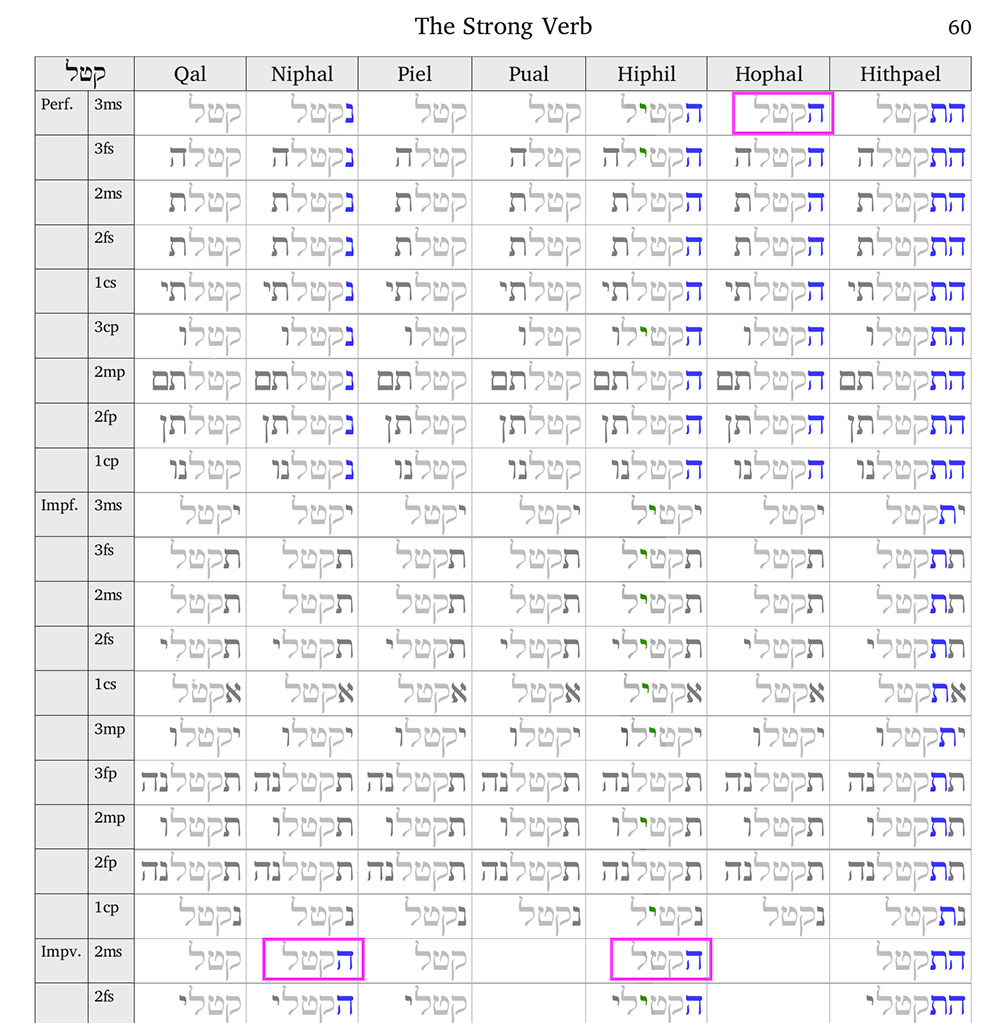Chapter 4
 Jonah 4:4
Jonah 4:4

| ל ך | חרה | ה היטב | יהוה | ו יאמר |
| to yourself/walk | he has burned | was he caused to be good | He Is | and he is saying |
9016 | None Definition: verseEnd Root: None Exhaustive: None 9031 | ך None Definition: you, personal pronoun - verb/prep. 2nd person masculine singular Root: None Exhaustive: Personal object pronoun - suffix for propositions and verbs without an object: 2nd person masculine singular 9005 ל None Definition: to, for Root: None Exhaustive: None | 2734 חרה chârâh Definition: to glow or grow warm; figuratively (usually) to blaze up, of anger, zeal, jealousy Root: a primitive root (compare H2787 (חרר)); Exhaustive: a primitive root (compare חרר); to glow or grow warm; figuratively (usually) to blaze up, of anger, zeal, jealousy; be angry, burn, be displeased, [idiom] earnestly, fret self, grieve, be (wax) hot, be incensed, kindle, [idiom] very, be wroth. See תחרה. | 3190 | יטב yâṭab Definition: to be (causative) make well, literally (sound, beautiful) or figuratively (happy, successful, right) Root: a primitive root; Exhaustive: a primitive root; to be (causative) make well, literally (sound, beautiful) or figuratively (happy, successful, right); be accepted, amend, use aright, benefit, be (make) better, seem best, make cheerful, be comely, [phrase] be content, diligent(-ly), dress, earnestly, find favour, give, be glad, do (be, make) good(-ness), be (make) merry, please ([phrase] well), shew more (kindness), skilfully, [idiom] very small, surely, make sweet, thoroughly, tire, trim, very, be (can, deal, entreat, go, have) well (said, seen). 9008 ה None Definition: ? (interrog.) Root: None Exhaustive: the / or (interrog. particle) | 3068 יהוה Yᵉhôvâh Definition: Jehovah, Jewish national name of God Root: from H1961 (היה); (the) self-Existent or Eternal; Exhaustive: from היה; (the) self-Existent or Eternal; Jehovah, Jewish national name of God; Jehovah, the Lord. Compare יה, יהוה. | 559 | אמר ʼâmar Definition: to say (used with great latitude) Root: a primitive root; Exhaustive: a primitive root; to say (used with great latitude); answer, appoint, avouch, bid, boast self, call, certify, challenge, charge, [phrase] (at the, give) command(-ment), commune, consider, declare, demand, [idiom] desire, determine, [idiom] expressly, [idiom] indeed, [idiom] intend, name, [idiom] plainly, promise, publish, report, require, say, speak (against, of), [idiom] still, [idiom] suppose, talk, tell, term, [idiom] that is, [idiom] think, use (speech), utter, [idiom] verily, [idiom] yet. 9001 ו None Definition: sequential 'and' Root: None Exhaustive: Verbal vav: joined to verb with no intervening prefix (usually conversive) (future<->past) |
RBT Hebrew Literal:
and he is saying He Is was he caused to be good he has burned to yourself/walk
RBT Paraphrase:
If you did not make a good one, you missed! Genesis 4:7
And He Is is saying, "Has he made good? He has burned angrily to yourself!"4Julia Smith Literal 1876 Translation:
And Jehovah will say, Didst thou well for thee to be angry?
And Jehovah will say, Didst thou well for thee to be angry?
LITV Translation:
And Jehovah said, Is anger rightly kindled in you?
And Jehovah said, Is anger rightly kindled in you?
ESV Translation:
And the LORD said, “Do you do well to be angry?”
And the LORD said, “Do you do well to be angry?”
Brenton Septuagint Translation:
And the Lord said to Jonah, Art thou very much grieved?
And the Lord said to Jonah, Art thou very much grieved?
Footnotes
| Jon. 4:4 | Hebrew ההיטב The first letter ה, understood as the interrogative ה, leaves היטב. This was interpreted as a Hiphil causative, but the proper Hiphil causative form is היטיב. Cf. Genesis 12:16, "ולאברם היטיב בעבורה" "and Abraham has made well/good for the sake of herself..." The form היטב fits only the Hophal, "he was made good/he was caused to be good" or the imperative Niphal and Hophal. The imperative obviously would not fit with the interrogative ה.
|
